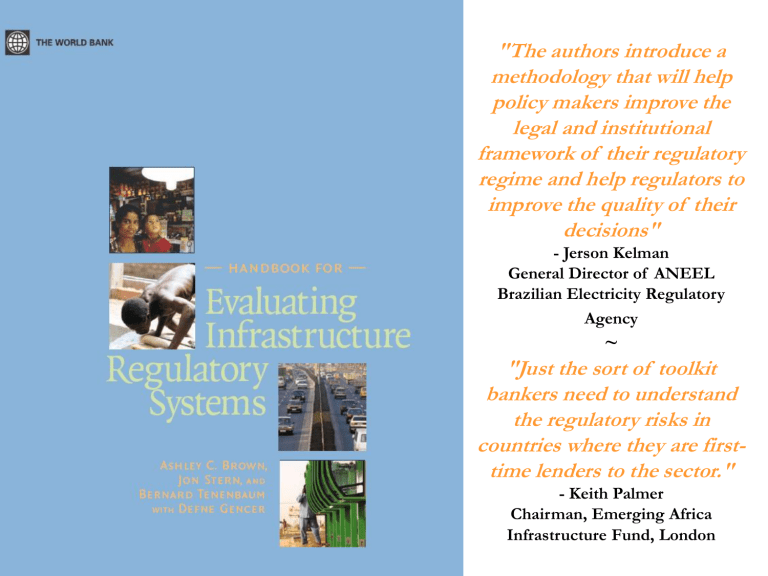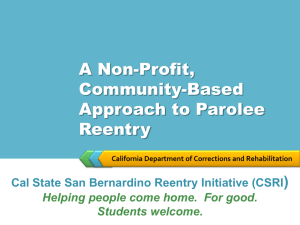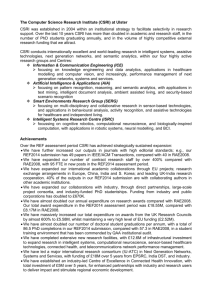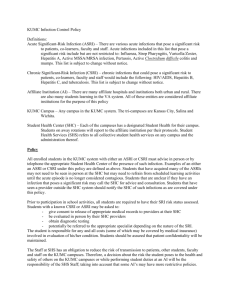spring_book_party_07

"The authors introduce a methodology that will help policy makers improve the legal and institutional framework of their regulatory regime and help regulators to improve the quality of their decisions"
- Jerson Kelman
General Director of ANEEL
Brazilian Electricity Regulatory
Agency
~
"Just the sort of toolkit bankers need to understand the regulatory risks in countries where they are firsttime lenders to the sector."
- Keith Palmer
Chairman, Emerging Africa
Infrastructure Fund, London
• The Public Role of Private Enterprise: Evaluating
What Works, Developing Leaders, Supporting
Policy and Practice. CSRI 2nd Anniversary Report
2004-2006
Jane Nelson | Corporate Social Responsibility
Initiative | 2006 | CSRI Report No. 11
• The Role of Business in Society: An Agenda for
Action
Niall Fitzgerald and Mandy Cormack| Corporate
Social Responsibility Initiative | 2006 | CSRI Report
No. 12
• Business as a Partner in Strengthening Public
Health Systems in Developing Countries: An
Agenda for Action
Jane Nelson | Corporate Social Responsibility
Initiative, The Conference Board and International
Business Leaders Forum (IBLF) | 2006 | CSRI
Report No. 13
• Business as a Partner in Overcoming
Malnutrition: An Agenda for Action
Jane Nelson | Corporate Social Responsibility
Initiative, The Conference Board and International
Business Leaders Forum (IBLF) | 2006 | CSRI
Report No. 14
"Leveraging the Private Sector provides critical insights into the environmental behavior of corporations and various management-based approaches to influencing that behavior. It provides a useful alternative to the traditional dichotomy between free markets and command-and control regulation in thinking about how to meet environmental goals. Policymakers, business managers, lawyers, advocates, and academic analysts will all find it valuable and fascinating reading."
--Barton H. Thompson, Jr.,
Stanford University
• Does Monitoring Improve Labor
Standards?: Lessons from Nike
Richard Locke, Fei Quin, and Alberto
Brause | July 2006 | CSRI Working Paper
No. 24
• Operating in Insecure Environments
Jane Nelson | August 2006 | CSRI Working
Paper No. 25
• Beyond Corporate Codes of Conduct:
Work Organization and Labor Standards in Two Mexican Garment Factories
Richard Locke and Monica Romis | August
2006 | CSRI Working Paper No. 26
• Constructing the License to Operate:
Internal Factors and their Influence on
Corporate
Environmental Decisions
Jennifer Howard-Grenville, Jennifer Nash, and Cary Coglianese | August 2006 | CSRI
Working Paper No. 27
"Packed with ideas and information, Full Disclosure is, by far, the best book to date on the problem of public transparency. The authors offer a host of indispensable lessons for citizens and policymakers in diverse domains, including education, pollution, national security, and health care. At the same time, Full Disclosure is an important contribution to democratic theory -- and a great read to boot."
- Cass Sunstein, University of Chicago Law School
• Human Rights Policies and Management
Practices of Fortune Global 500 Firms:
Results of a Survey
John Ruggie | October 2006 | CSRI Working
Paper No. 28
• Meaningful Change: Raising the Bar in
Supply Chain Workplace Standards
Roseann Casey | November 2006 | CSRI
Working Paper No. 29
• Social Risk as Strategic Risk
Tamara Bekefi, Beth Jenkins, and Beth Kytle |
December 2006 | CSRI Working Paper No.
30
• Business Recognition of Human Rights:
Global Patterns, Regional and Sectoral
Variations
Michael Wright and Amy Lehr | December
2006 | CSRI Working Paper No. 31
• “It is our hope that the topics discussed in this volume will provide useful information both to the government of China and to AIDS researchers worldwide who are working to support an effective and timely response to
China’s AIDS epidemic. As the epicenter of the epidemic shifts from Africa to Asia, China has the opportunity to benefit from the harsh lessons learned in Africa and keep its epidemic in check. The consequences of not doing so could be life or death for hundreds of thousands of Chinese citizens.”
- Introduction
• Building the Institutional Infrastructure for
Corporate Social Responsibility
Sandra Waddock | December 2006 | CSRI
Working Paper No. 32
• Do Corporate Social Responsibility Ratings
Predict Corporate Social Performance?
Aaron K. Chatterji, David I. Levine, and Michael
W. Toffel | February 2007 | CSRI Working
Paper No. 33
• The Operation of Non- Governmental
Organizations (NGOs) in a World of
Corporate and Other Codes of Conduct
Jane Nelson | March 2007 | CSRI Working
Paper No. 34
• Encouraging CSI in Italy: The Enabling Role of Government in Mandating, Motivating, and Supporting Responsible Business
Practices
Francesco Perrini | April 2007 | CSRI Working
Paper No. 35
• “This is the third research collaboration published by the authors. Not inclined to bite the hand that feeds them — the very agency whose programs they review funds their research
— the scholars are courteous but very tough analysts. Theirs is a sort of onethumb-up endorsement of innovation regulatory programs in general and Performance
Track in particular. ”
- Crosslands Bulletin
• Too Good to Be True? An
Examination of Three Economic
Assessments of California Climate
Change Policy
Robert N. Stavins, Judson Jaffe, and
Todd Schatzki | RPP-2007-01
• Understanding the Patchwork
Quilt of Electricity Restructuring in the United States
Mark L. Fagan| RPP-2006-04
• Business Ethics: The Law of
Rules
Michael L. Michael| RPP-2006-03
• Measuring and Explaining
Electricity Price Changes in
Restructured States
Mark L. Fagan| RPP-2006-02
“This report responds to various elements of subparagrabs (a) through (c) as well as (e) of the mandate (Commission on Human
Rights resolution 2005/69):
‘standards of corporate responsibility and accountability….with regard to human rights;’ ‘the role of States in effectively regulating and adjudicating business activities;’ the subject of corporate
‘complicity;’ and identifying some prevailing, if not ‘best’ practices by states and companies.”
• South Africa: Macroeconomic
Challenges after a Decade of Success
By Jeffrey Frankel, Ben Smit and Federico
Sturzenegger
Working Paper Number:RWP07-021
Submitted: 04/24/2007
• Recent US Free Trade Initiatives in the
Middle East: Opportunities but no
Guarantees
By Robert Z. Lawrence
Working Paper Number:RWP06-050
Submitted: 12/06/2006
• China and the Multilateral Trading
System
By Robert Z. Lawrence
Working Paper Number:RWP06-045
Submitted: 10/20/2006
• A New Compensation Mechanism for
Preference Erosion in the Doha Round
By Robert Z. Lawrence and Tatiana Rosito
Working Paper Number:RWP06-044
Submitted: 10/20/2006
“The role of industry in fighting poverty and achieving progress towards the
Millenium Development Goals (MGDs) is of critical importance. I am convinced that the path to sustained poverty reduction is to create wealth by empowering the private sector to invest in the productive sectors such as manufacturing and the production of higher value-added products, within an enabling policy and regulatory framework established by government. There can be no sustained poverty reduction without capacity building, productivity growth and the development of competitive production structures. The challenge presents itself at two levels: first, the need to dynamise economic development in a bottom up process, especially through small enterprise development, and secondly, the need to engage global business players in effective linkages and broader partnerships for development.”
- Dr. Kenneth Yumkella, UNIDO-Director General
Towards Pro-Poor Industrial Development:
A Shared Vision for UNIDO, 2005
• Pharmaceutical Innovation
By F.M. Scherer
Working Paper Number:RWP07-004
Submitted: 02/05/2007
• Essential Drugs
By F.M. Scherer
Working Paper Number:RWP07-003
Submitted: 02/05/2007
• Corporate Structure and the Financial
Support of U.S. Symphony Orchestras
By F.M. Scherer
Working Paper Number:RWP07-002
Submitted: 01/23/2007
• Paltering
By Frederick Schauer and Richard
Zeckhauser
Working Paper Number:RWP07-006
Submitted: 02/06/2007
The “Genome” of Health Care Delivery Innovation:
Productivity Research
Karen Eggleston (Tufts University) & Jerome Grossman (Harvard KSG
Health Care Delivery Program)
“The Harvard/Kennedy School Health Care Delivery Policy Program
(HCDP) seeks to understand what changes would be needed to move the US health care delivery system toward a system that is effective, accessible, efficient and integrated. Measurement of the benefits and costs of medical care services is central to this effort, and a productivity research group is among the core research projects associated with the Program. Indeed, Jerome Grossman, Director of the HCDP, sees productivity research as “the genome of health care delivery.” Now is the right time to invest a significant amount of resources in a focused set of projects to create a core knowledge base for designing the health care delivery system, not unlike how research on the human genome has created a core knowledge base for clinical science.”
• Two Simple Mechanisms for Advancing the Democratic Governance of Hong
Kong
By Thomas S. Axworthy and Herman B.
Leonard
Working Paper Number:RWP06-034
Submitted: 08/03/2006
• Useful Void: The Art of Forgetting in the
Age of Ubiquitous Computing
By Viktor Mayer-Schoenberger
Working Paper Number:RWP07-022
Submitted: 04/24/2007
• Market Effects of Regulatory
Heterogeneity: A Study of Regional
Gasoline Content Regulations
By Erich Muehlegger
Working Paper Number:RWP06-021
Submitted: 06/04/2006
• Automating Public Financial
Management in Developing Countries
By Stephen Peterson
Working Paper Number:RWP06-043
Submitted: 10/03/2006
"This is a fine collection for all students of foreign trade and international cooperation in practice."
- Foreign Affairs
These case studies in multilateral trade policymaking and dispute settlement explore the changing substance of trade agreements and also delve into the negotiation process—the who, how, and why of decisionmaking. The books present a coherent description of the facts that will allow for discussion and independent conclusions about policies, politics, and processes.
• Soldiers Returning from Iraq and
Afghanistan: The Long-term Costs of
Providing Veterans Medical Care and
Disability Benefits
By Linda Bilmes
Working Paper Number:RWP07-001
Submitted: 01/08/2007
• The Economic Costs of the Iraq War: An
Appraisal Three Years after the Beginning of the Conflict
By Linda Bilmes and Joseph E. Stiglitz
Working Paper Number:RWP06-002
Submitted: 01/11/2006
• Citizen Participation in Rulemaking: Past,
Present, and Future
By Cary Coglianese
Working Paper Number:RWP06-027
Submitted: 06/28/2006
• After the Scandals: Changing Relationships in Corporate Governance
By Cary Coglianese and Michael L. Michael
Working Paper Number:RWP06-024
Submitted: 06/23/2006
• This book provides a discussion of the general impact of
WTO membership on both sides of the Taiwan Strait, and addresses the political and economic impact on cross-Strait relations of common membership.
• Investing in the Unknown and
Unknowable
By Richard Zeckhauser
Working Paper Number:RWP07-005
Submitted: 02/05/2007
• Permits to Elicit Information
By Erzo F.P. Luttmer, Richard
Zeckhauser and Carolyn Kousky
Working Paper Number:RWP06-049
Submitted: 12/06/2006
• Mechanism Design with
Multidimensional, Continuous
Types and Interdependent
Valuations
By Nolan Miller, John H. Pratt,
Richard Zeckhauser and Scott
Johnson
Working Paper Number:RWP06-028
Submitted: 07/14/2006








